Oriflame Cosmetics SA Bundle
How did a Swedish startup become a global beauty giant: The Oriflame story?
Oriflame Cosmetics SA, a name synonymous with beauty and direct selling, boasts a fascinating history. Founded in Sweden in 1967, Oriflame Cosmetics SA SWOT Analysis embarked on a mission to redefine the cosmetics industry. This Swedish cosmetics company offered a unique business model, empowering individuals to build their own businesses.
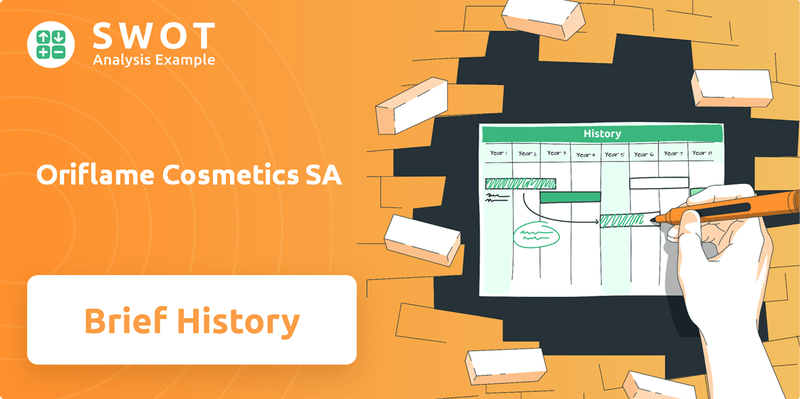
This exploration into the brief history of Oriflame Cosmetics will uncover the key milestones that shaped this cosmetics company. From its early focus on natural ingredients to its global expansion, we'll examine the strategic decisions and innovations that propelled Oriflame to its current market position. Discover the evolution of its beauty products and the lasting impact of its social selling model.
What is the Oriflame Cosmetics SA Founding Story?
The story of Oriflame Cosmetics SA began on March 15, 1967. It was the brainchild of brothers Jonas and Robert af Jochnick, along with their friend Bengt Hellsten. They saw an opportunity to offer natural, high-quality beauty products directly to consumers.
This direct-selling approach, bypassing traditional retail, was a key part of their plan. They aimed to empower individuals, especially women, to earn money by selling products they believed in. This innovative model set the stage for what Oriflame Cosmetics would become.
The initial focus was on skincare, using natural Swedish ingredients. The name 'Oriflame' was chosen to evoke excellence and quality, drawing inspiration from the ancient French royal banner, the 'Oriflamme'. Early funding came from the founders themselves and initial sales, showcasing their confidence in the venture.
Oriflame history started with a vision to provide natural beauty products through direct selling. This approach allowed the company to bypass traditional retail markups. The founders aimed to empower individuals by offering them an income opportunity.
- Oriflame Cosmetics SA was founded on March 15, 1967.
- The founders were Jonas and Robert af Jochnick, and Bengt Hellsten.
- The initial focus was on skincare products.
- The business model was based on direct selling and multi-level marketing (MLM).
The 1960s provided a perfect backdrop, with growing interest in natural products and increased opportunities for women. This environment was ideal for Oriflame's innovative business model, which combined high-quality Swedish cosmetics with a unique sales approach. The company's early success was built on this foundation, setting the stage for its future growth. For a deeper dive into the competitive landscape, consider reading about the Competitors Landscape of Oriflame Cosmetics SA.
Oriflame Cosmetics SA SWOT Analysis
- Complete SWOT Breakdown
- Fully Customizable
- Editable in Excel & Word
- Professional Formatting
- Investor-Ready Format
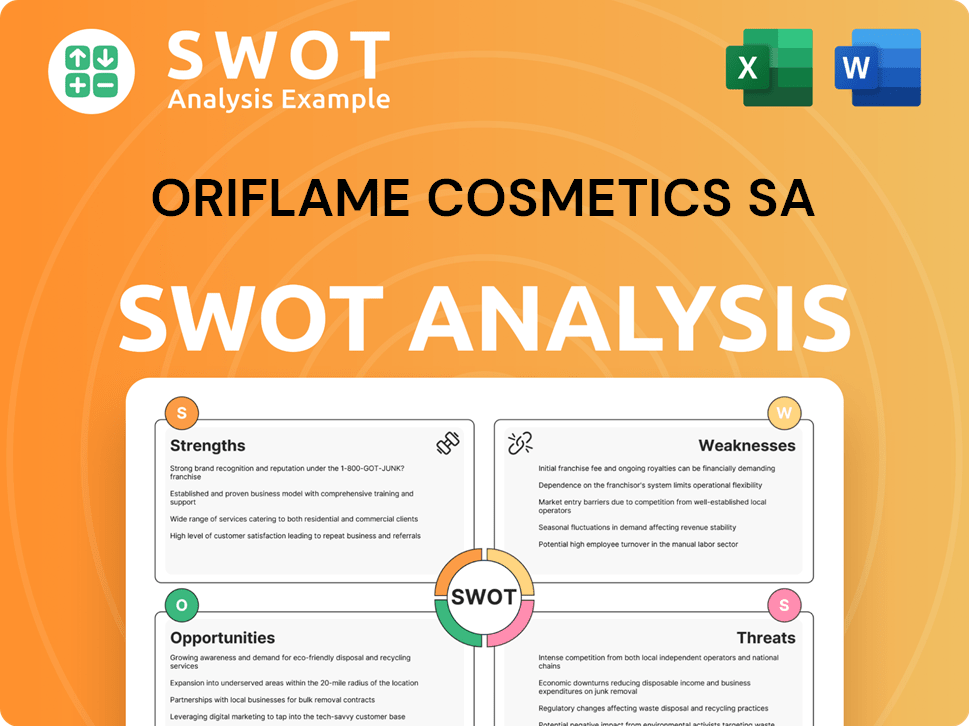
What Drove the Early Growth of Oriflame Cosmetics SA?
The early growth of Oriflame Cosmetics SA, a Swedish cosmetics company, was marked by swift expansion across Scandinavia and other European markets. Following its founding in 1967, the company quickly gained a foothold in Denmark, Norway, and Finland. This initial phase focused on expanding its skincare range and introducing new categories like fragrances and makeup. The direct selling model, combined with appealing product offerings, attracted consumers and aspiring entrepreneurs, leading to notable sales achievements.
Oriflame's initial focus was on establishing a strong presence in Scandinavia. By the early 1970s, it had successfully entered Denmark, Norway, and Finland. This early success provided a solid foundation for further international expansion. The company's early strategy centered on direct selling, which allowed for personalized customer engagement and rapid market penetration.
Early product launches by Oriflame included skincare, fragrances, and makeup, catering to a wide range of consumer needs. The direct selling model was a key marketing strategy, utilizing consultants to build relationships and drive sales. The focus on natural ingredients and a strong community aspect differentiated Oriflame within the cosmetics industry.
By the 1970s, Oriflame expanded beyond Scandinavia, entering the United Kingdom, Germany, and the Netherlands. This internationalization was a crucial strategic decision, driving significant revenue growth. The company established local offices and distribution centers to support its growing network of consultants. For more insights into the company's approach, consider reading about the Marketing Strategy of Oriflame Cosmetics SA.
Key leadership transitions during this period saw the founders maintaining a strong influence while building a professional management team. Oriflame's adaptable business model allowed it to navigate diverse market receptions and competitive landscapes. By the end of the 1970s, Oriflame had established itself as a significant direct-selling beauty company in Europe, setting the stage for its future global reach. The company's emphasis on natural ingredients and community building helped it stand out.
Oriflame Cosmetics SA PESTLE Analysis
- Covers All 6 PESTLE Categories
- No Research Needed – Save Hours of Work
- Built by Experts, Trusted by Consultants
- Instant Download, Ready to Use
- 100% Editable, Fully Customizable
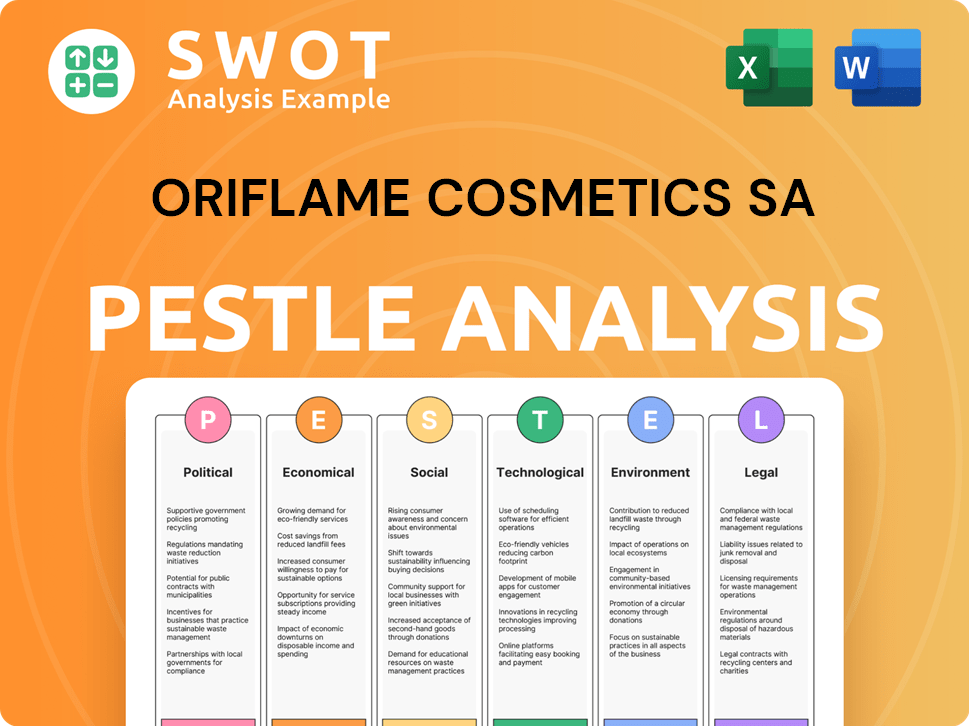
What are the key Milestones in Oriflame Cosmetics SA history?
The Oriflame history is filled with significant milestones that have shaped its journey as a leading Swedish cosmetics company. From its inception, Oriflame SA has consistently evolved, adapting to market dynamics and consumer preferences.
| Year | Milestone |
|---|---|
| 1967 | Oriflame Cosmetics was founded by the af Jochnick brothers in Sweden, marking the beginning of the company's journey. |
| 1970s | Oriflame expanded internationally, establishing a presence in several European countries and beyond. |
| 1980s | The company continued its global expansion, entering new markets and solidifying its position as a major player in the direct-selling industry. |
| 1990s | Oriflame went public, further boosting its growth and visibility in the global market. |
| 2000s | Oriflame launched its Wellness by Oriflame range, diversifying its product portfolio and tapping into the health and wellness market. |
| 2010s | The company focused on digital transformation, enhancing its online presence and supporting its consultant network. |
| 2020s | Oriflame continues to adapt to changing consumer behaviors and market trends, with a strong emphasis on sustainability and innovation. |
Oriflame Cosmetics has consistently embraced innovation, developing new products and technologies to meet evolving consumer needs. The introduction of the Wellness by Oriflame range was a groundbreaking move, expanding the product line beyond traditional beauty products.
Oriflame invested in research and development to create advanced skincare technologies, such as AspartoLift technology, which is used in anti-aging creams. This innovation has helped the company to stay competitive in the market.
The launch of the Wellness by Oriflame range, which diversified the product portfolio beyond traditional cosmetics, was a significant innovation. This move allowed Oriflame to tap into the growing health and wellness market.
Oriflame has collaborated with fashion designers for limited-edition collections, which has elevated its brand appeal. These partnerships help the company to reach new customers and stay relevant in the market.
Oriflame has undertaken digital transformation initiatives to enhance its online presence and support its consultants. This has improved the company's ability to reach customers and manage its sales network.
A renewed focus on sustainability in product development and operations has been a key innovation. Oriflame is committed to reducing its environmental impact and promoting ethical business practices.
Continuous investment in research and development has resulted in patents for advanced skincare technologies and natural ingredient formulations. This ensures that Oriflame products remain competitive.
Oriflame SA has faced several challenges throughout its history, requiring strategic adjustments and resilience. Market downturns, such as economic recessions, have impacted consumer spending and sales.
Economic recessions have impacted consumer spending, affecting sales and profitability. Oriflame has had to adapt its strategies to navigate these challenging times.
Intense competition from both traditional beauty brands and emerging direct-selling companies has posed a challenge. The company has had to differentiate itself through innovation and brand appeal.
Product failures, though rare, have provided learning opportunities and led to a renewed focus on quality control. This has helped Oriflame to improve its product development processes.
Managing a vast and diverse global consultant network has necessitated robust communication and support systems. Oriflame has invested in these systems to support its consultants effectively.
Significant strategic pivots, including digital transformation and a focus on sustainability, have been necessary. These changes have helped Oriflame to stay relevant and competitive.
Restructuring and rebranding efforts, along with leadership changes, have been crucial for overcoming challenges. These actions have helped Oriflame to adapt to changing market conditions.
Oriflame Cosmetics SA Business Model Canvas
- Complete 9-Block Business Model Canvas
- Effortlessly Communicate Your Business Strategy
- Investor-Ready BMC Format
- 100% Editable and Customizable
- Clear and Structured Layout
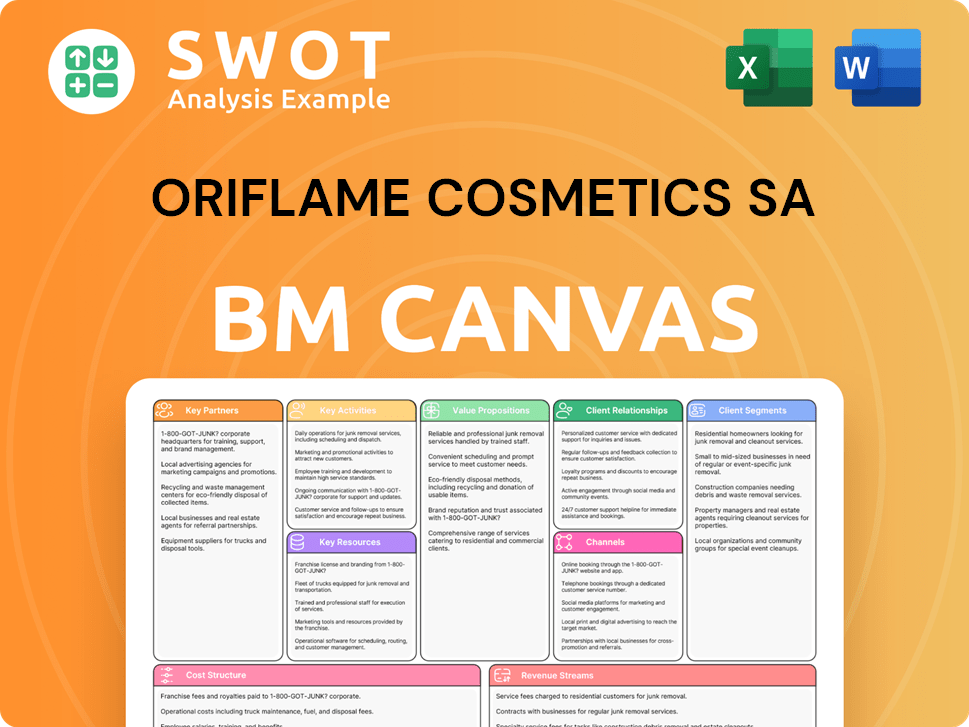
What is the Timeline of Key Events for Oriflame Cosmetics SA?
The Oriflame Cosmetics SA story began in 1967 when Jonas and Robert af Jochnick and Bengt Hellsten founded the Swedish cosmetics company. The company's journey includes significant expansions, embracing digital transformation, and adapting to global challenges. Key milestones include listing on the London Stock Exchange in 1982, major expansions in the 1990s, and the launch of its e-commerce platform in 1999. More recently, the company has focused on digital tools, social selling, and sustainability, reflecting its evolution in the beauty industry and its commitment to its consultants and customers.
| Year | Key Event |
|---|---|
| 1967 | Founded in Sweden by Jonas and Robert af Jochnick and Bengt Hellsten. |
| 1970s | Expanded into several European markets, including the UK and Germany. |
| 1982 | Listed on the London Stock Exchange, marking a significant step in its financial growth. |
| 1990s | Major expansion into Central and Eastern Europe and Asia, capitalizing on emerging markets. |
| 1999 | Launched its first e-commerce platform, embracing digital transformation. |
| 2009 | Introduced the 'Wellness by Oriflame' range, diversifying its product portfolio. |
| 2015 | Continued focus on digital tools and social selling for consultants. |
| 2020 | Navigated global pandemic challenges, accelerating digital adoption and online sales. |
| 2024 | Focus on sustainable product development and packaging, aligning with global environmental trends. |
| 2025 | Expected continued growth in key emerging markets and further integration of AI and personalized beauty solutions. |
The company is set to strengthen its digital ecosystem. This includes leveraging advanced analytics and AI. The goal is to provide personalized recommendations and improve the consultant experience. This approach aims to enhance customer engagement and sales.
Expansion plans will continue to target high-growth regions. Asia and Latin America are key areas of focus. Direct selling models remain popular in these markets. The company aims to capitalize on these trends.
Innovation roadmaps include sustainable and ethically sourced products. The company is exploring new product categories in health and beauty. This aligns with growing consumer demand for eco-friendly options.
Leadership emphasizes empowering entrepreneurs and fostering a global community. This approach ties back to the founding vision. The goal is to democratize beauty through accessible products and opportunities.
Oriflame Cosmetics SA Porter's Five Forces Analysis
- Covers All 5 Competitive Forces in Detail
- Structured for Consultants, Students, and Founders
- 100% Editable in Microsoft Word & Excel
- Instant Digital Download – Use Immediately
- Compatible with Mac & PC – Fully Unlocked
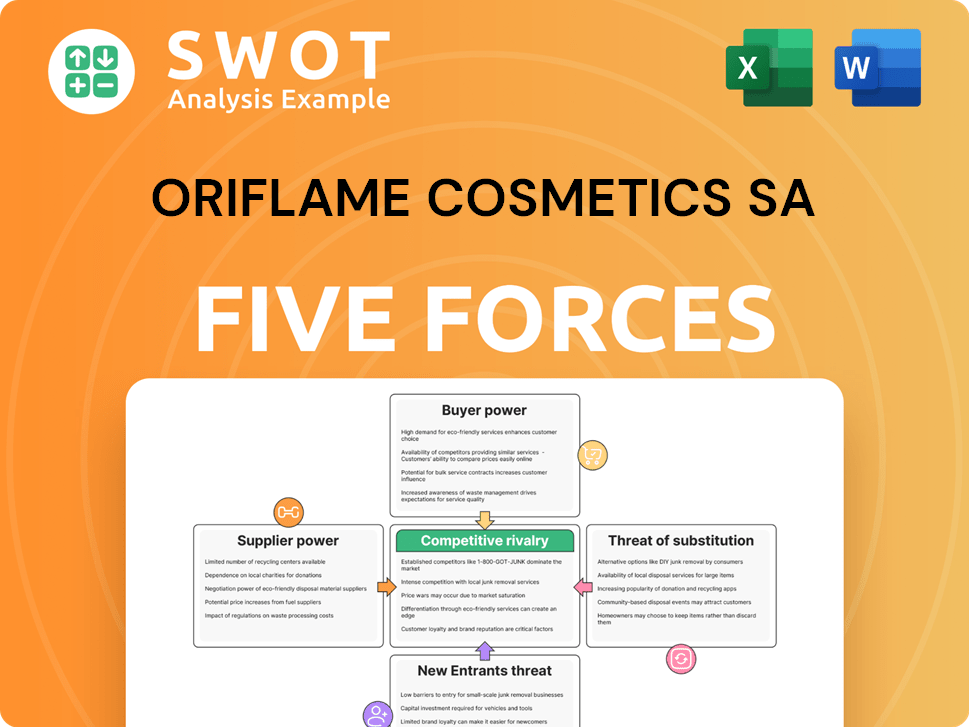
Related Blogs
- What is Competitive Landscape of Oriflame Cosmetics SA Company?
- What is Growth Strategy and Future Prospects of Oriflame Cosmetics SA Company?
- How Does Oriflame Cosmetics SA Company Work?
- What is Sales and Marketing Strategy of Oriflame Cosmetics SA Company?
- What is Brief History of Oriflame Cosmetics SA Company?
- Who Owns Oriflame Cosmetics SA Company?
- What is Customer Demographics and Target Market of Oriflame Cosmetics SA Company?
Disclaimer
All information, articles, and product details provided on this website are for general informational and educational purposes only. We do not claim any ownership over, nor do we intend to infringe upon, any trademarks, copyrights, logos, brand names, or other intellectual property mentioned or depicted on this site. Such intellectual property remains the property of its respective owners, and any references here are made solely for identification or informational purposes, without implying any affiliation, endorsement, or partnership.
We make no representations or warranties, express or implied, regarding the accuracy, completeness, or suitability of any content or products presented. Nothing on this website should be construed as legal, tax, investment, financial, medical, or other professional advice. In addition, no part of this site—including articles or product references—constitutes a solicitation, recommendation, endorsement, advertisement, or offer to buy or sell any securities, franchises, or other financial instruments, particularly in jurisdictions where such activity would be unlawful.
All content is of a general nature and may not address the specific circumstances of any individual or entity. It is not a substitute for professional advice or services. Any actions you take based on the information provided here are strictly at your own risk. You accept full responsibility for any decisions or outcomes arising from your use of this website and agree to release us from any liability in connection with your use of, or reliance upon, the content or products found herein.